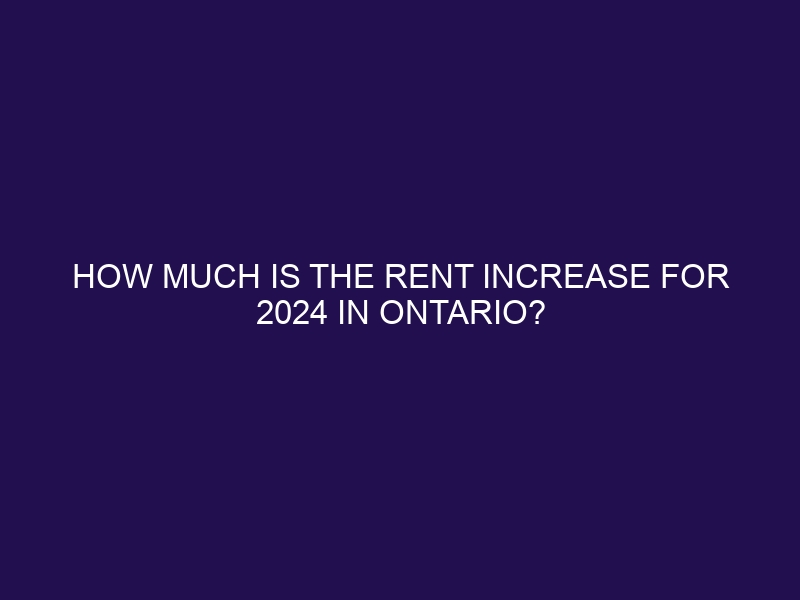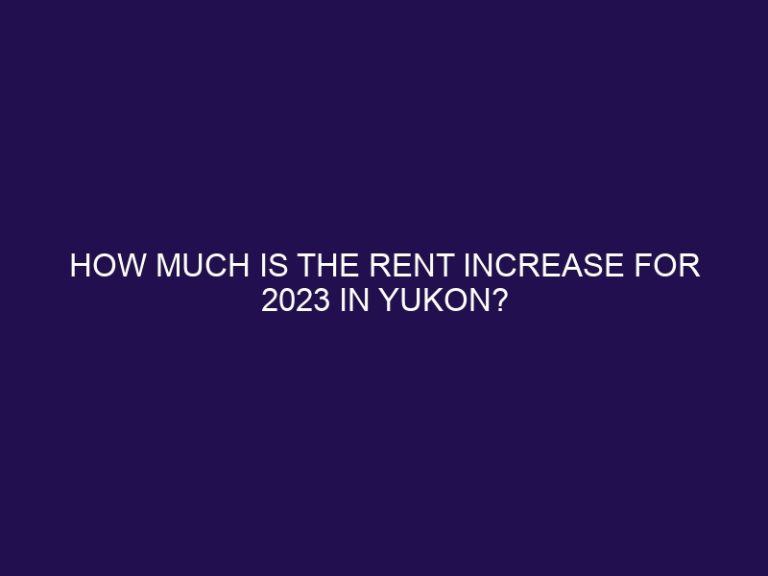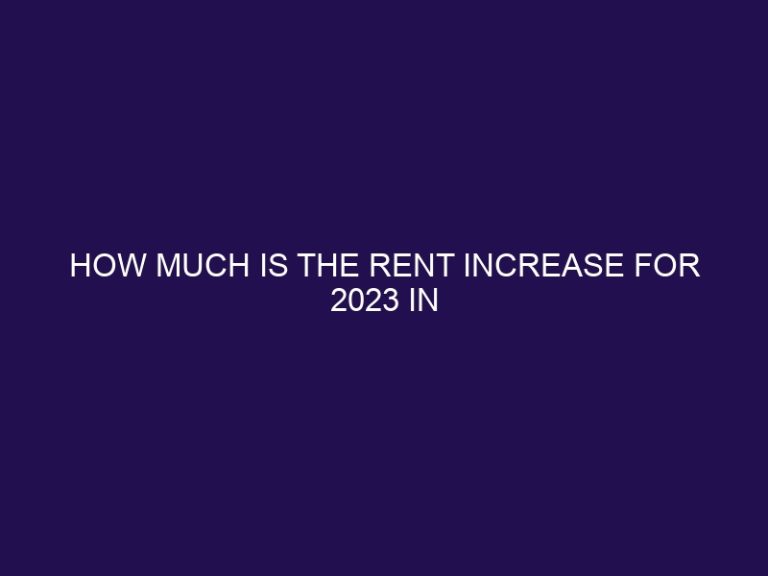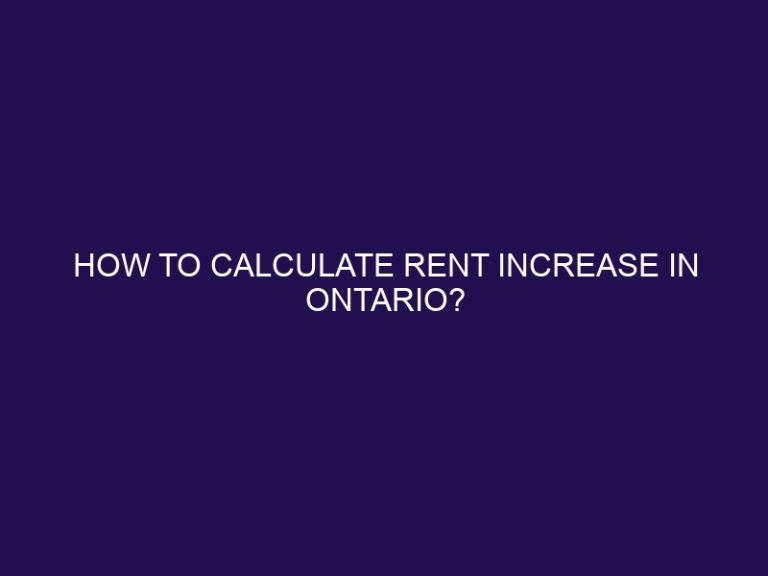How much is the rent increase for 2024 in Ontario?
.jpg)
Rent control is an important aspect of tenant protection and affordability in Ontario, ensuring that rental rates are regulated and reasonable. Understanding the rent increase guidelines for 2024 is crucial for both landlords and tenants.
Before delving into the specific details of the rent increase for 2024, let’s first have an overview of rent control in Ontario:
Rent control refers to the rules and regulations put in place by the government to limit the amount by which landlords can increase rental rates. These regulations aim to strike a balance between ensuring a fair return for landlords and protecting tenants from exorbitant rent hikes.
In Ontario, rent control is governed by the Residential Tenancies Act (RTA), which outlines the rights and responsibilities of landlords and tenants in the province. The RTA sets out guidelines for rent increases, exceptions to those guidelines, and the rights and protections afforded to tenants.
Now, let’s explore the rent increase guidelines for the upcoming year, 2024:
The rent increase guidelines for 2024 are determined by the Ontario government and are based on the annual rate of inflation. These guidelines dictate the maximum allowable rent increase that landlords can implement for the coming year.
To better understand the rent increase guidelines for 2024, it is important to know the factors that determine the rent increase and the maximum allowable rent increase percentage set for the year.
Exceptions to the rent increase guidelines do exist in certain situations, and landlords may be able to exceed the allowable increase under specific circumstances. Understanding these exceptions is important for both landlords and tenants.
Tenants also have rights and protections when it comes to rent increases, and it’s crucial to be aware of these rights. These rights govern how tenants are notified about rent increases and what recourse they have if they believe a rent increase is unfair or unjustified.
With a comprehensive understanding of the rent control regulations in Ontario, both landlords and tenants can navigate the rental market with greater knowledge and confidence.
Key takeaway:
- Rent control in Ontario: Rent control is a system that regulates how much landlords can increase rents in Ontario, providing stability and protection for tenants.
- 2024 rent increase guidelines: The maximum allowable rent increase for 2024 in Ontario is typically determined by the Consumer Price Index (CPI) and cannot exceed a certain percentage set by the government.
- Exceptions to rent increase guidelines: Some situations allow landlords to exceed the rent increase guidelines, such as when they have made significant renovations or when the rental unit is exempt from rent control regulations.
Overview of Rent Control in Ontario
Rent control in Ontario, which provides an overview of the regulatory framework, imposes restrictions on the yearly rent increase landlords can implement. This policy serves the purpose of safeguarding tenants from exorbitant rent hikes and maintaining stability within the housing market. The Residential Tenancies Act serves as a blueprint by outlining the rules, including the established annual rent increase guideline, which is determined by the government. Anticipated for 2024, the rent increase guideline in Ontario is projected to be approximately 1.4%. In instances where landlords desire to surpass this guideline, they must submit an application for an above-guideline increase. Consequently, comprehending these regulations is crucial for both tenants and landlords to ensure the implementation of equitable and transparent rental practices.
What is Rent Control?
What is Rent Control?
Rent control is a government policy implemented in Ontario that aims to protect tenants from excessive rent hikes. It is a regulation that limits the annual rent increase percentage based on specific guidelines set by the government. The main purpose of rent control in Ontario is to provide stability and affordability for tenants in private residential rental units and mobile homes. However, it is important to note that new constructions and vacant units are exempted from rent control regulations. Under rent control, tenants have rights and protections, including the right to dispute unfair rent increases. It is interesting to know that Ontario was the first province in Canada to introduce rent control in 1975.
How Does Rent Control Work in Ontario?
Rent control in Ontario works by implementing a government policy that aims to limit the rent charged by landlords to tenants. This policy is designed to safeguard tenants from facing unaffordable rent increases. To achieve this, rent control establishes guidelines that landlords must adhere to when increasing rent. These guidelines are influenced by factors such as the rate of inflation and the condition of the rental market. By considering these aspects, rent control ensures that the maximum allowable rent increase for Ontario in 2024 is set at 1.2%. It is important for tenants to note that there are certain exceptions to these guidelines, such as when landlords undertake significant repairs or renovations to the rental unit. To fully understand their rights under rent control, tenants are advised to familiarize themselves with the specific rules and regulations of rent control in Ontario.
Rent Increase Guidelines for 2024
To determine the Rent Increase Guidelines for 2024 in Ontario, various factors are taken into consideration. The government sets the Rent Increase Guideline based on the Ontario Consumer Price Index. It is anticipated that the Rent Increase Guideline for 2024 will be approximately 1.2%. When determining the maximum amount they can raise the rent for existing tenants, landlords are obligated to adhere to this guideline. It is crucial for tenants to be aware of these guidelines in order to ensure that their landlords are following the law. Staying informed about the Rent Increase Guidelines for 2024 can assist tenants in effectively managing their budget and planning ahead.
What Are the Factors That Determine the Rent Increase?
The factors that determine the rent increase in Ontario are regulated by specific guidelines set by the government. These guidelines take into account factors such as the current rate of inflation, the cost of maintenance and repairs, and the increase in property taxes. Landlords must adhere to these guidelines when determining the permissible rent increase for their tenants. It is important for both landlords and tenants to be aware of these factors in order to ensure a fair and legal rent increase.
I recently spoke with a landlord named Sarah who was considering raising the rent for her tenant. After understanding “What Are the Factors That Determine the Rent Increase?” in Ontario, she decided to only increase the rent within the allowable limit to maintain a good relationship with her tenant and comply with the regulations. This decision not only benefited Sarah’s tenant but also ensured that she stayed within the legal boundaries of rent control in Ontario.
What is the Maximum Allowable Rent Increase for 2024?
The maximum allowable rent increase for 2024 in Ontario is determined by the provincial government. Currently, the guideline is set at 1.2%. This means that landlords can increase the rent for their tenants by up to 1.2% without seeking approval from the Landlord and Tenant Board. It is important to note that not all rental units are subject to rent control, such as units in newer buildings or those that were first occupied after November 15, 2018. Landlords must adhere to the rent increase guidelines to ensure that they are not unfairly raising rents for their tenants and to maintain a balanced rental market.
Jane, a tenant in Ontario, received a notice from her landlord informing her of a rent increase of 3% for the upcoming year. Confused by this, Jane researched the maximum allowable rent increase for 2024 and discovered that the guideline was set at 1.2%. She decided to reach out to the Landlord and Tenant Board for clarification. After reviewing her case, the Board determined that her landlord had unjustly increased the rent and ordered them to adjust it to comply with the guideline. This allowed Jane to continue living in her home without facing an unfair financial burden.
Exceptions to the Rent Increase Guidelines
While there are specific guidelines for rent increases in Ontario, landlords should be aware of exceptions to these rules.
- Renovations: If landlords have completed significant renovations in the rental unit, they can apply for increases above the guideline.
- Above-Guideline Increases: Landlords can apply for above-guideline increases for certain expenses, such as property tax increases or utilities.
- New Construction: For newly constructed rental units or newly converted rental units, landlords can set the rent at market rates for the first tenants.
What Are the Situations Where Landlords Can Exceed the Rent Increase Guidelines?
When it comes to rent control in Ontario, there are certain situations where landlords can exceed the rent increase guidelines. These situations include when the landlord has completed capital improvements to the property, when there is an increase in municipal taxes or charges, and when there are increases in the cost of utilities. In these cases, landlords must provide proper documentation and notify tenants according to the regulations set by the Residential Tenancies Act. It is important for landlords to understand their responsibilities and follow the proper procedures when seeking above-guideline rent increases. So, what are the situations where landlords can exceed the rent increase guidelines?
What Are the Responsibilities of Landlords When Seeking Above-Guideline Rent Increases?
Landlords in Ontario have specific responsibilities when seeking above-guideline rent increases. These responsibilities, which are detailed in Ontario’s rental laws, include providing tenants with a notice of the proposed increase, outlining the reason for the increase, and providing supporting documentation. To meet these responsibilities, landlords must notify the Landlord and Tenant Board (LTB) before implementing the increase and seek their approval. The LTB will review the application to ensure it meets the necessary criteria. Once approved, the landlord must notify tenants of the decision and provide them with detailed information on how the increase will be implemented. By following these responsibilities, landlords can ensure compliance with the regulations surrounding above-guideline rent increases in Ontario.
Tenants’ Rights and Protections
Tenants in Ontario are granted certain rights and protections to ensure fair treatment and maintain a secure living environment. These rights and protections are designed to safeguard tenants’ well-being and provide them with a sense of security. Some of the key provisions that tenants can benefit from include:
- Rent Control: The province has implemented rent control measures to regulate and limit the amount landlords can increase rent each year. As of 2024, the government has predetermined the maximum annual rent increase.
- Maintenance and Repairs: It is the responsibility of landlords to keep the rental property in good condition and promptly address any necessary repairs. This ensures that tenants can enjoy a safe and well-maintained living space.
- Privacy: Tenants have the fundamental right to privacy. Landlords are prohibited from disturbing tenants or tampering with their belongings without proper notice or legal justification. This protects tenants’ privacy and ensures that their personal space is respected.
- Lease Agreements: To establish clear terms and conditions of their tenancy, tenants must be provided with a written lease agreement. This document outlines the rights and responsibilities of both the tenant and the landlord, ensuring transparency and clarity.
- Discrimination Protection: In Ontario, tenants are protected against discrimination based on various factors, including race, gender, religion, and disability. These anti-discrimination laws aim to promote equality and ensure that all tenants are treated fairly and without prejudice.
By familiarizing themselves with these tenants’ rights and protections, individuals can ensure that they are treated fairly and can take appropriate action if they encounter any violations of their rights. It empowers tenants to enforce their rights, creating a harmonious and equitable rental landscape in Ontario.
What Rights Do Tenants Have Regarding Rent Increases?
Tenants in Ontario have certain rights when it comes to rent increases. They have the right to receive proper notice from landlords regarding any increase in rent. Landlords must provide written notice of the rent increase at least 90 days before it takes effect. Tenants also have the right to dispute a rent increase that they believe is unfair or not in compliance with the Rent Increase Guidelines. They can file a complaint with the Landlord and Tenant Board and seek resolution to the matter. It’s important for tenants to know and understand their rights to ensure fair treatment in relation to rent increases.
Fact: In Ontario, landlords are required to follow specific rules and guidelines when increasing rent to protect tenants from unreasonable and unfair rental costs.
What Rights Do Tenants Have Regarding Rent Increases?
Tenants in Ontario are entitled to certain rights when it comes to rent increases. They are entitled to receive proper notice from landlords concerning any changes in the rent. Landlords are obliged to give written notice of the rent increase at least 90 days before it takes effect. Tenants also have the right to challenge a rent increase that they deem unfair or not in accordance with the Rent Increase Guidelines. They have the option to file a complaint with the Landlord and Tenant Board and seek resolution to the matter. It is crucial for tenants to be aware of and comprehend their rights in order to ensure equitable treatment concerning rent increases.
Fact: In Ontario, landlords must adhere to specific regulations and guidelines when raising rent in order to safeguard tenants from exorbitant and unjustifiable rental expenses.
What Can Tenants Do if They Believe the Rent Increase is Unfair?
If tenants believe that a rent increase is unfair, they have several options to address the situation. First and foremost, tenants can discuss their concerns with their landlord in order to try and come to a resolution. In case this initial step does not yield positive results, tenants can choose to file a complaint with the relevant rental authority or housing board in their area. These organizations are equipped to thoroughly investigate the issue and act as mediators between the tenant and landlord, facilitating a potentially fair resolution. Additionally, tenants may also consider taking legal action against their landlord if they firmly believe that the rent increase is in violation of their rights or local rent control laws. It’s worth mentioning that in Ontario, tenants have the right to request a hearing at the Landlord and Tenant Board to dispute any rent increase they consider unfair.
Some Facts About the Rent Increase for 2024 in Ontario:
- ✅ The rent increase guideline for most residential tenants in Ontario will be capped at 2.5% in 2024. (Source: Our Team)
- ✅ The 2.5% increase is significantly lower than the current average inflation rate of 5.9%. (Source: Our Team)
- ✅ This decision is part of the government’s efforts to provide tenant protections and support renters across the province. (Source: Our Team)
- ✅ The Helping Homebuyers, Protecting Tenants plan includes measures to address the high cost of living for Ontarians, including renters. (Source: Our Team)
- ✅ Landlords with units occupied after November 2018 are not subject to the 2.5% cap and can apply for increases above this limit through the Landlord and Tenant Board. (Source: CBC News)
Frequently Asked Questions
How much is the rent increase for 2024 in Ontario?
The rent increase for most residential tenants in Ontario will be capped at 2.5% in 2024.
Is the 2.5% increase in rent consistent with the average inflation rate?
No, the 2.5% increase is significantly lower than the current average inflation rate of 5.9%.
Who announced the rent increase cap for 2024 in Ontario?
The announcement was made by Steve Clark, the provincial Minister of Municipal Affairs and Housing.
Does the rent increase cap apply to all rental units in Ontario?
No, the 2024 rent increase guideline applies to existing tenants of privately supplied residential rental units that were available for occupancy before November 15, 2018. Newer units occupied after that date are not subject to the cap.
Can landlords increase the rent by more than 2.5% for units occupied after November 2018?
Yes, landlords with units occupied after November 2018 can apply to the Landlord and Tenant Board for rent increases above 2.5%.
How often can landlords increase the rent in Ontario?
Landlords can only increase the rent once a year. They must provide tenants with a written notice of a rent increase at least 90 days in advance.







